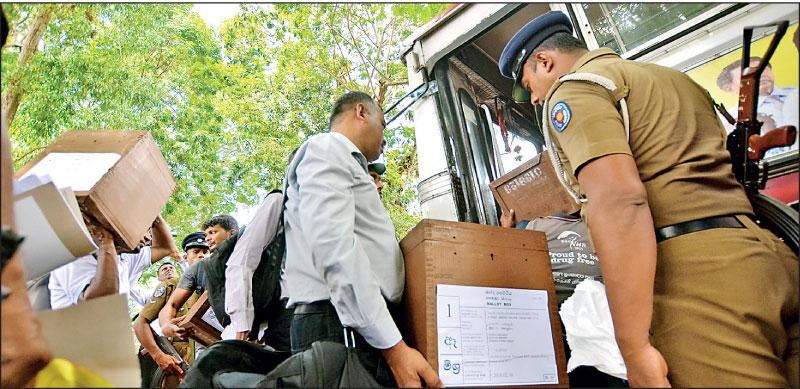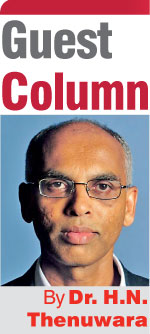Tuesday Feb 17, 2026
Tuesday Feb 17, 2026
Thursday, 7 March 2024 00:25 - - {{hitsCtrl.values.hits}}

Sri Lankan people may remain hopeful that a new and pure Government may usher in a new policy regime to bring in long-awaited prosperity to them – Pic by Shehan Gunasekara
 Sri Lanka will face elections sometime in the future, and a new Government may be elected. It could be led by one of the old political parties or could be a brand-new party. The purpose of this note is to provide some thoughts on designing a pragmatic economic policy regime by the incoming new Government.
Sri Lanka will face elections sometime in the future, and a new Government may be elected. It could be led by one of the old political parties or could be a brand-new party. The purpose of this note is to provide some thoughts on designing a pragmatic economic policy regime by the incoming new Government.
Policy regime options
The major economic policy regimes are capitalist, socialist, and mixed regimes. Capitalist regimes are based on laissez-faire (leave us alone in French) principle and Adam Smith’s doctrine as outlined in his seminal book, ‘The Wealth of Nations’ published in 1776. In a capitalist regime, all production resources, distribution and exchange of goods and services are owned by private individuals and entities. The Government provides essential services such as safety and security of the market, maintaining law and order, protecting property rights, and resolving disputes. The other extreme is the socialist regime where the society (in effect, the Government) owns, and controls all means of production, distribution, and exchange of goods and services. Individuals contribute to production by their abilities, and the production is distributed according to individual needs.
Neither capitalist nor socialist regimes in pure forms exist anywhere in the world. Instead, what we find are the mix of these regimes. This mix went through major changes after the Great Depression of 1929-1939, when the capitalist governments in the USA and Western Europe realised that the Government has an important role to play in maintaining economic stability and enhancing human welfare. It went through further changes in 1978 when the socialist China realised that private ownership of production, distribution and exchange of goods and services increases economic growth tremendously.
Further evidence on the failure of extreme forms of socialism, and central planning came from the disintegration of the USSR in 1989 and the Great Famine that resulted from the ‘Central Planning’ under Mao in China in 1959. Nevertheless, experiments with high degree of socialism in the economic policies were carried out by many developing countries in the 1970s, only to find that they were failures.
Socialist policy failures in developing countries
Many developing countries in South Asia, Sub-Saharan Africa and Latin America experimented with increasing the socialist presence in the mix of economic policies to promote their economies in the 1970s. The results were failures. At the same time, the countries which continued to follow predominantly capitalist policies such as Hong Kong, Singapore, South Korea, and Malaysia experienced spectacular economic growth rates during and after 1970s.
Some of the socialist policies adopted by countries that experimented with socialism were import substitution, import controls, nationalisation (Government acquisition and bringing the enterprise under Government control) of private enterprises, setting up of State-owned enterprises and land reforms. Thus, Government became a major player in the economy. However, the Government could not perform its duties properly due to principal-agent problems and rent-seeking.
Principal-agent problem is dishonesty of agents appointed to run Government institutions. Rent-seeking is unscrupulous individuals self-selecting through political favours to commanding positions of Government institutions. These problems arise when politicians and bureaucrats who run the Government institutions, and institutions themselves are not subject to any accountability and checks and balances. The result is that the politicians and bureaucrats begin to accept bribes and embezzle Government funds.
The countries that suffered from principal-agent problems and rent seeking faced many other problems. Import substitution, import control and nationalisation negatively impacted on innovation and creativity of the private sector as well as foreign direct investment and domestic investment. State-owned enterprises became loss making enterprises, and burdens on the Government. Land reforms became meaningless waste of lands. Corruption and rent seeking among politicians and bureaucrats emerged. The combined effect was gradually declining national income.
As economies of those countries shrank, they experienced wide budget deficits and severe foreign exchange problems. Almost all those countries then turned to the World Bank and the International Monetary Fund (IMF) for relief. The relief came with policy recommendations for economic reforms as conditionalities. The recommendations were ‘Neo-Liberal’ economic policies that adheres to the ‘Washington Consensus’. The objective was to reverse the socialist policies.
Neo-liberal economic policies and Washington Consensus
As the name suggests neo-liberal economic policies are new twists on liberal economic policies involving minimum Government intervention, meant to reverse the socialist policies of those countries. Washington Consensus is a list of actions the developing countries are required to do to receive aid which both the World Bank and the IMF would agree and would comply with neo-liberal paradigm. Those are broadly policies to minimise Government involvement in the economy, reduce Government expenditure, reform tax system, liberalise financial sector, reduce trade restrictions, allow flexible exchange rate system, liberalise investments, privatise state-owned enterprises, promote competition, and protect property rights.
The implementation of those policies was very difficult due to the resistance by beneficiaries of corrupt systems. It also led to labour disputes and political upheavals. A further disadvantage was the loss of flexibility to formulate a unique mix of liberal economic policies with appropriate degree of Government involvement, as being successfully practiced in Scandinavian countries. Their model is called the ‘Market Socialism’.
Market socialism
Market socialism is the mix of laissez-faire or market economic policies with an appropriate degree of Government intervention in production, distribution, and exchange as well as in providing social welfare. While a major portion of production, distribution and exchange is carried out by private enterprises in a free and liberal trade and investment environment, the Government also runs few enterprises, and provides social welfare funded through an appropriate amount of taxes. The secret of its success is the complete elimination of corruption in the Government sector.
The purity in the Government sector is seen in their high rank in ‘Corruption Perception Index’ published by the ‘Transparency International’, a global research institution. In the latest ranking of 2022, Denmark is ranked one, Finland is ranked two, Norway is ranked four and Sweden is ranked five. Sri Lanka is ranked 101 out of 180 countries. Thus, as it is, market socialism will be a distant dream for Sri Lanka unless a major effort is undertaken to purify the Government.
A pragmatic policy regime
Building a pragmatic policy regime begins with an evaluation of the nature and quality of the existing political regime, politicians, government, government institutions and bureaucrats. If all those entities are corrupt no socialist economic policy regimes will work well.
As seen in international rankings, Sri Lanka suffers from a high degree of corruption. The reason for the prevalence of corruption is not having checks and balances as well as not having a comprehensive set of institutions dedicated to upholding transparency and accountability of all political and Government entities. Thus, the first step of establishing a good policy regime is to reform and clean the government and government institutions and set up new institutions to uphold transparency and accountability. A good starting point is to study the government sector in countries that successfully practice market socialism.
After reforming the Government and securing a top rank in the Corruption Perception Index, the new Government may embark on a new policy regime. They may be able to continue with state-owned enterprises without privatising them, because reforms will convert them to profit making institutions. They may also continue to provide essential Government services. Those are promoting economic activities, maintaining the law and order, and protecting property rights. They may not hinder free and competitive markets and free trade which are the main drivers of innovation.
The Government may perform a few more essential functions. In view of the gains through positive externality, the Government may promote research and development. It may provide public goods such public infrastructure, and public health among many others. It may intervene in the market to resolve any sub-optimal outcomes arising from imperfect market conditions such as monopolies and both positive and negative externalities.
As proven in fundamental theorems of welfare economics, the competitive markets do not address some economic issues such as inequality and poverty. However, though the Government should address these problems, it should not be concerned with ‘end-point’ inequality which is income inequality, but should ensure ‘process’ equality, which is providing equal opportunities to everyone to achieve economic success. Another important policy lesson is never to attempt nationalisation of private property or private enterprises and undertake any land reforms. Those policies implemented in the 1970s were the main causes of frightening away investments, brain drain and present sad state of corruption and under-development of Sri Lanka’s economy.
This leads to the determination that an optimal policy regime is a mix policy regime of free market to a large degree, and socialism or Government involvement to some degree after the purity of the Government is established. Sri Lankan people may remain hopeful that a new and pure Government may usher in a new policy regime to bring in long-awaited prosperity to them.
(The writer has worked at the Central Bank of Sri Lanka as the Superintendent of Public Debt, Director of Economic Research, and an Assistant Governor. At present he teaches Economic Theory and Policy at the University of Iowa, USA. He may be contacted through [email protected].)